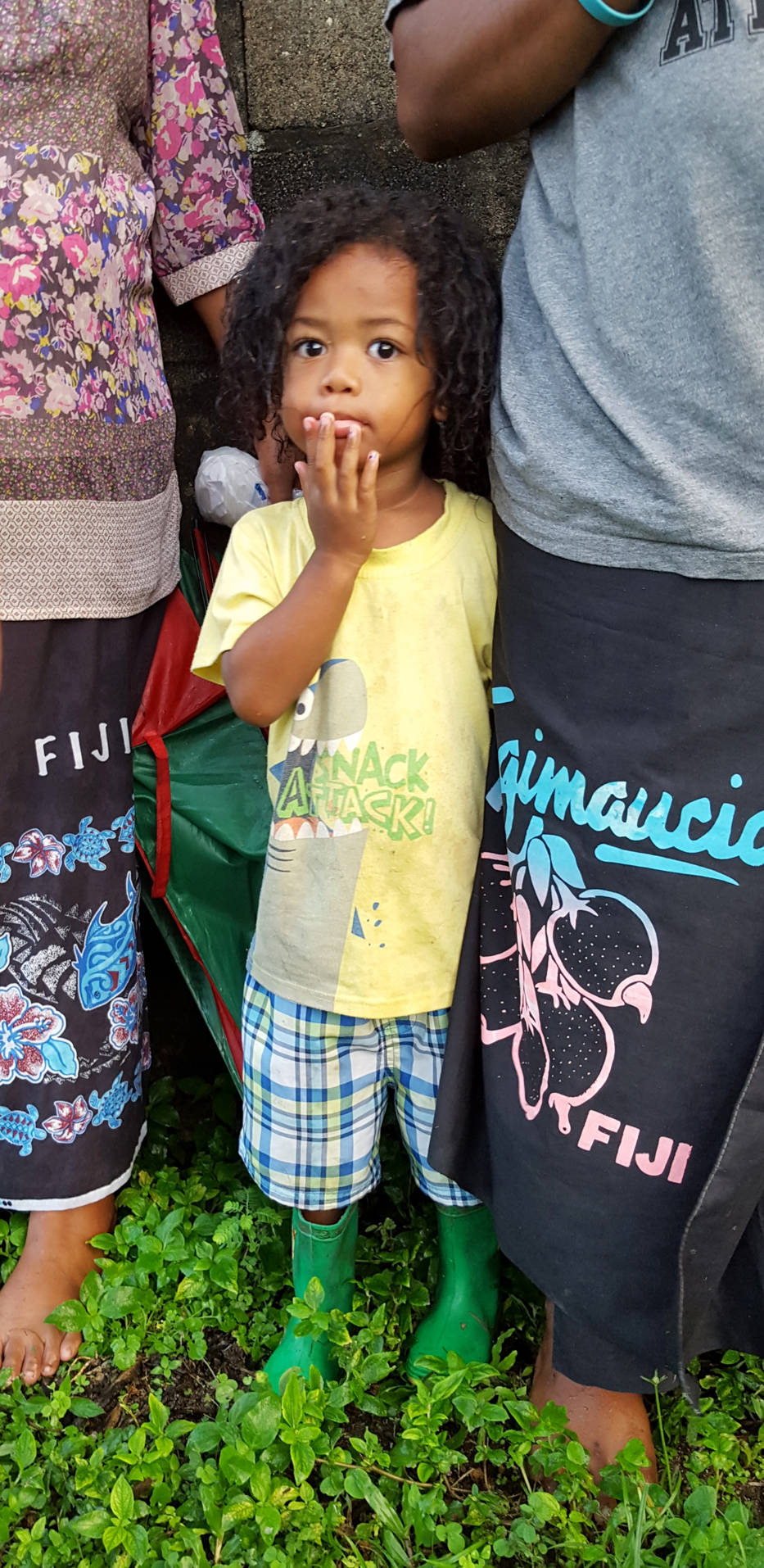An 11-hour flight from Los Angeles, 1 hour flight from Nadi, and a 2-hour 4-wheel-drive trek along the rugged, sun-drenched coast of Taveuni Island will get you to the village of Waitabu. A bumbling grouping of 50 people living in 15 huts, Waitabu faces an outstretched morning-sun Pacific Ocean. This is a place of relentless, unabashed, breathtaking beauty.
The weary traveler is overtaken by the sight of the surrounding countryside — a tiny green basket of life dotted with 90-foot-tall coconut palms and strangler figs bigger than city buses. You pass village men, machete in hand, on their way to tend wildish fields of taro and cassava. You pass beneath centurion mango trees, giant fruit bats roosting in their canopies. Sheer 200-foot living walls of forest greenery surround the village, where you sleep in the embrace of an extinct volcano. You are greeted by a sea of elated children, treated to feasts, given the only beds in the household, and you are made an actual villager in a cultural ritual dating back hundreds of years. Now, being a villager, you could come back and build a house.
If paradise was ever a place, it lived in the Fijian Islands. It is still there. If you are adventurous enough to escape the Americanized 5-star resorts on mangrove-bulldozed man-made islands, complete with Mexican restaurants, you can find it. If you are really adventurous, the kind of person with an open mind and an open heart, you might realize that it isn’t the view that manifests paradise but, rather, the people.
In the middle of the village sits a once happy, sea-foam green house with no windows, no roof, and most of the walls torn away. Pictures of family remain, left and faded by sun and rain. A few pieces of furniture are randomly strewn about but it is otherwise abandoned. Chunks of corrugated steel hide on the reef and in the rainforest. Our last clue is a sudden rain event sending village children hurtling into their homes, terrified.
Herein lies the unspoken but obvious remnants of Cyclone Winston, the strongest storm to make landfall in Fiji and the South Pacific Basin. It happened in this village three months before I visited with undergraduate students studying abroad from Michigan State University.
The storm originally passed south of Fiji only to double back two days later. A Category 5 storm, Winston reached sustained winds of 145 mph on February 20, 2016. In all of Fiji, 40,000 homes were damaged or destroyed and 350,000 people were significantly impacted, amounting to $1.4 billion in damages and 44 deaths.
You might chalk this up as a tragedy, a freak incident or even to poor planning, and move on with your day. Fiji is 5,600 miles away from Soldotna and there’s nothing you can do about it. You aren’t connected to this. But, in a way, you are.
Even if we make no connections between a warming planet and cyclone activity, climate change has exacerbated vulnerabilities of island nations in other ways. Waitabu is especially vulnerable to storm surges from sea level rise and its subsequent coastal erosion and saltwater inundation. More than 800 Fijian communities have already been impacted, 3 villages have been relocated, and 45 villages need to be relocated in the next decade.
Developed nations like the U.S. produce an overwhelmingly larger proportion of global carbon emissions than developing countries like Fiji, yet these poorer nations disproportionately feel the ramifications. In 2013, the U.S. ranked 13thin the world with 4.4 metric tons of carbon emitted per person while Fiji ranked 131st with 0.5 metric tons per person. These statistics don’t reflect what I see in Waitabu, where villagers have no vehicle, washing machine, nor electricity besides that from solar panels, and whose carbon emissions come from cooking over a fire. The people of Waitabu, in this little droplet of paradise, are faces of climate inequality.
It’s a sobering notion that the poorest of people will be the hardest hit by a warming climate. It seems reasonable that folks living furthest from a carbon-dependent lifestyle would experience the least effects, but it’s quite the opposite. Climate knows no boundaries.
Alaska has its own cases of climate inequality in the tiny village of Shishmaref. Inhabited for 400 years, it was recently evacuated due to thawing permafrost, stronger storm surges and shoreline erosion. In the past 60 years Alaska has warmed by 1.7 degrees, twice that of the Lower 48. Like the villagers in Waitabu and Shishmaref, here on the Kenai Peninsula we will see the effects of a changing climate
earlier and more strongly than our friends and family down south.
Unless we take a meaningful step beyond the confines of comfort and stability in daily life can we truly see the effects of it on other people and other places – and do something about it. That far-off idea of an unspoiled, untouched paradise is fading away. It is touched. It is spoiled—by an unavoidably connected atmosphere.
When I read the headlines about Cyclone Winston, it felt as if it happened in in my hometown. I could picture my friends— real people with lives like mine, suffering. Don’t allow yourself to normalize environmental catastrophe or human indifference. Meet and love people different than you, go forth and flaunt your humanity. If folks become as globalized as the atmosphere we are disrupting, we will emphatically stand up, evoke change and demand it from others.
Tracy Melvin, a Michigan State University graduate student, is researching climate adaptation on the Kenai National Wildlife Refuge. Find more information about Kenai National Wildlife Refuge at http://www.fws.gov/refuge/kenai/ or http://www.facebook.com/kenainationalwildliferefuge.

